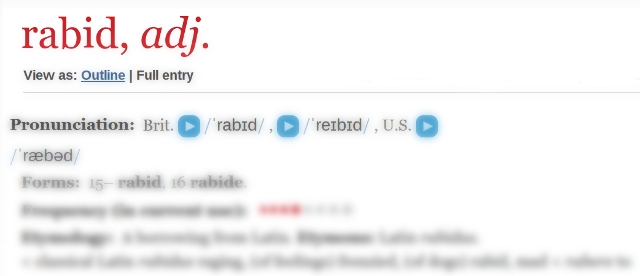
One of the founding elements of my being is my belief that words matter. If I didn’t believe that then I wouldn’t study literature, and I wouldn’t get angry on the internet every week. As a feminist, I’m also very aware of the way that word choice, and subtle differences in word choice, negatively affect women. Men are “players” and women are “sluts” when they exhibit the same sexual behaviors. Women who are ambitious are “aggressive” rather than “assertive,” a change in tone and meaning that makes women angry instead of forceful. Our default setting for a random imaginary person is to call said person “he.” Most of the time, these quirks of language get very little attention, and even less effort to actually do anything to change the status quo.
So I was pleasantly surprised to see that when Michael Oman-Regan began asking questions about the sexist use of language in the Oxford English Dictionary, the internet actually paid attention for once. (And in an interesting side note, Michael Oman-Regan, like many men on the internet, experienced a lot of attention for something that he later realized a woman on the internet had pointed out long before and received little attention for. And unlike many of the men who realize they are doing the gender equivalent of Columbusing when they “discover” a problem with sexism and then do nothing to point to the women who were having the conversation before them *cough* Hannibal Burress *cough* Oman-Regan had the good grace to repeatedly link Nordette Adams’ earlier piece on the same topic. Good show, Oman-Regan.)
What Oman-Regan, and Adams before him, noticed was that a lot of the Oxford English Dictionary’s usage examples for various words had very retro (here used to mean “bad”) gender ideas backing them up. “Shrill” had “the rising shrill of women’s voices” “nagging” used “a nagging wife” and our good friend “promiscuous” was given the usage example “she’s a wild, promiscuous, good time girl.” Meanwhile men got to be the default setting for usage examples for “doctor” and “research.” The example that likely turned the most heads, however, was the usage example for “rabid”: “rabid feminist.” Now, as someone who has been called a rabid feminist, I can tell you that this definition is not doing feminists any favors. And when Oman-Regan’s points began to gain traction, the fine folks at the OED initially reacted in a less than respectful and helpful manner, tweeting “If only there were a word to describe how strongly you felt about feminism.” It’s so cute when a company tries to get clever instead of actually responding to the problem that has been raised. The best part of the tweet was an online commenter named Tyler Morrison pointing out that the OED, as the place that has you know, all the words, should probably be better at synonyms: “Passionate? Heartfelt? Fervid? Your synonym game is weak, Oxford.”
Now, to a certain extent, I can sympathize with what Oxford sees as their role in the curating of language. As Carolyn Cox writes, Oxford has defended its role as “a descriptive, rather than prescriptive, dictionary; in other words, it’s not their lexicographers’ jobs to record how language should be used, but rather, how it is being used.” The examples that they use are drawn from common language and usage, and they see themselves as simply replicating that common usage. And again, to a certain extent, I understand their position. They are trying to show the use of language “as is,” and they don’t want to feel as if they have a role in how the words are used. But I believe that it is naïve to think that they are not taking a prescriptive role simply by being the Oxford English Dictionary. As far as I’m aware, they are seen as the premier English dictionary in the world. If I’m writing an academic paper and defining a term, their definitions are the only ones I trust to not make me sound like an idiot. (Sorry, Merriam-Webster.) When they add new words to the dictionary, it makes the news. People can be murdered and not make the news. So when someone sees the usage examples that the Oxford English Dictionary provides, they have the weight of being a prescriptive usage. “Rabid” is now linked to “feminist” in the mind of whoever looked up the word rabid. After all, if rabid feminists were not a great concern, why would the OED use that as their example?
To Oxford’s credit, after the initial flub on Twitter, they apologized and promised to review their selection for the example sentence for “rabid.” Katherine Connor Martin, Oxford’s Head of Content Creation, also wrote a blog post in which she said that the company was “grateful” when readers point out problematic examples, as “cultural sensitivities may have evolved since a particular example was originally chosen.” The cynical side of me is willing to bet that this is the sort of “grateful” that happens when you say “thank you” through gritted teeth, but it does show that the company is willing to accept criticism and change with the times.
Ignoring the impact of language, and the impact of authorizing certain types of language, ignores one of the most powerful ways that we create and understand our world. Using an authoritative dictionary to call women rabid, shrill, and promiscuous has an effect on the way that we see women in general, whether the dictionary maker wants to admit that or not.
***
Elle Irise is a regular contributor to This Week In Tomorrow. When she’s not celebrating researchers for pointing out ossified sexism in canonical texts, she studies gender in popular culture.
